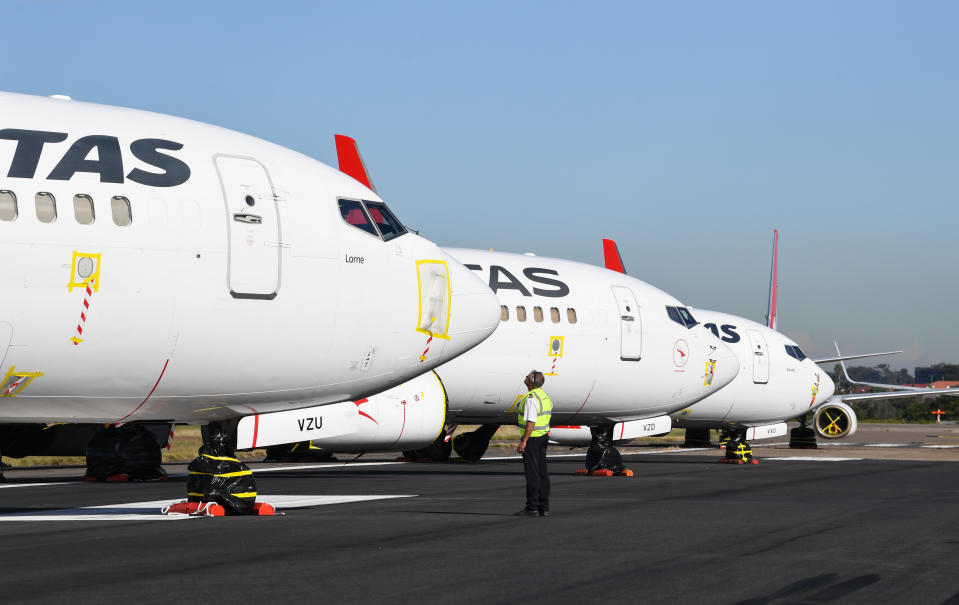Coronavirus heartbreak: 'I won’t see my parents for two years'
“Can Granny and Grandpop come to my birthday party?” my nearly six-year-old asked me last week. For what felt like the millionth time I explained to him that, no, because they live in England they aren’t allowed on a plane to visit us at the moment. What I couldn’t bring myself to tell him is that if they get here for his seventh birthday party, then we’ll be very lucky.
There are around a million Australians living overseas, and 28 per cent of Aussies were born overseas, so we are certainly not the only family separated due to Covid. Knowing we are not alone makes the situation slightly more bearable – but most days the separation pulls at my heartstrings at jarring intervals throughout the day.

When I moved to Australia from the UK last July, I knew it would be around a year before my parents could visit. Deciding to move to the other side of the world was hard, but my husband and I felt strongly that Australia was – and still is - the best place to raise our two young children. We made the decision with the proviso that we’d try and see each of my parents every year. They would come and visit for a few months at a time, so they could be part of our lives and maintain the strong bonds they have with their grandchildren. I justified it to myself by saying that if they visited for 12 weeks a year, we’d actually see them more than if we lived in the same country and popped in every other weekend.
A year apart seemed just about manageable. We could Facetime, send letters, and the children could count down the months until they visited. We timed their first trip so they could celebrate my little boy’s sixth birthday, take a family holiday with us, and live with us as we settle into our lives here.
They were due to arrive last week. Only of course, they aren’t here. Back in February, we skirted around the issue. Maybe Covid wouldn’t become as bad as predicted. Maybe the world would be back to normal by July. Of course, the maybes never eventuated, and now we’re looking at the very real possibility that it will be at least another year before we see each other.

Even if international travel is allowed in 2021, it might not be safe for them to get on a plane. Both in their early seventies, and predisposed to bronchitis, they’re in the high-risk category for being severely affected by Covid, so understandably nervous about flying.
We are lucky that we are all healthy and safe – and I know that’s the most important thing – but it is still hard on all of us. As things begin to open up in the UK and friends start to see grandchildren again, that’s still impossible for them. I worry they’re lonely, and that they’re missing out on a huge part of my children’s lives. They last saw us when my daughter was two; it seems unbelievable that she will almost at school by the time they next get to give her a cuddle.
I feel sad for my kids too. My daughter recently asked a friend’s grandma: “Can you be my granny?” It’s heartbreaking to think they’re missing out on the quality time that grandparents give.
For me, I just miss them. Knowing it will be another year before I get to sit across a table from my dad and hear him laugh, or pop to the shops with my mum is hard. While talking on Facetime is great, it’s not the same as being together. When my dad reads stories to the kids via video, I can barely watch when they try and sit in the “lap” of the computer to snuggle up to him.
‘Embrace the sadness’
It’s important to embrace this sadness, according to Sydney psychologist Dr Melissa Keogh.
“It can be helpful to accept the feelings that arise,” she tells me. “When we name our emotions it can help us see the issue more clearly. When we accept what it is, it allows us to take action that is more effective rather than borne out of frustration or anger.”
She tells me things might get easier if I accept the situation for what it is, and remember it isn’t permanent. “Practicing a degree of acceptance can be useful when dealing with feelings of powerlessness,” she says. “Using language such as; ‘I understand and accept the reality that I am currently unable to see my family due to the pandemic,’ can be helpful.
Think about the bigger picture too, which is that physical separation is keeping all of you at reduced risk of contracting a potentially life-threatening illness.”
Instead of feeling frustrated we can’t make future plans, she suggests reminiscing about shared memories, to help foster connection. “I would encourage family members to look through old photo albums together during their calls and reminisce about happy times,” she says.
The best advice I’ve had is from a friend who has lost someone to Covid. “You’re lucky to have someone to miss,” he told me. He’s right. I’ll take a seventh birthday party over the alternative any time. Maybe we’re lucky after all.
Sign up to our daily newsletter here to get all the latest news and hacks. Or get in touch at lifestyle.tips@verizonmedia.com.

 Yahoo Lifestyle
Yahoo Lifestyle 



